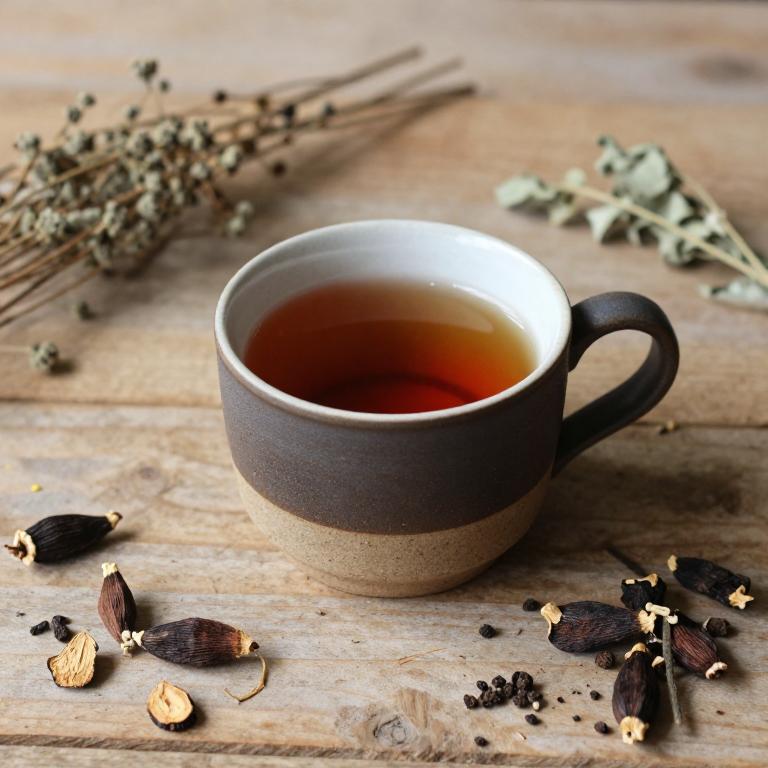10 Best Herbal Teas For Cough

Herbal teas are a natural and soothing remedy for coughs, often containing ingredients like ginger, licorice root, and eucalyptus that help reduce inflammation and loosen mucus.
These teas work by stimulating the body's natural healing processes and can be consumed warm to provide additional comfort. Many herbal teas are caffeine-free, making them a safe option for people of all ages, including children and pregnant women. Some blends also include honey or lemon, which further enhance their expectorant and antiseptic properties.
Overall, herbal teas offer a gentle, effective alternative to over-the-counter medications for managing cough symptoms.
Table of Contents
- 1. Eucalyptus (Eucalyptus globulus)
- 2. Thyme (Thymus vulgaris)
- 3. Chamomile (Matricaria chamomilla)
- 4. Ginger (Zingiber officinale)
- 5. Fennel (Foeniculum vulgare)
- 6. Stinging nettle (Urtica dioica)
- 7. Peppermint (Mentha piperita)
- 8. Chaste tree (Vitex agnus-castus)
- 9. Black pepper (Piper nigrum)
- 10. Cumin (Cuminum cyminum)
1. Eucalyptus (Eucalyptus globulus)

Eucalyptus globulus, commonly known as the Tasmanian eucalyptus, is widely used in herbal teas to help alleviate symptoms of coughs and respiratory discomfort.
The essential oils found in this plant, particularly eucalyptol, possess expectorant and antiseptic properties that can help loosen mucus and reduce inflammation in the airways. When brewed into a tea, eucalyptus globulus can provide a soothing effect, making it a popular natural remedy for dry or productive coughs. It is often combined with other herbs like ginger or thyme to enhance its therapeutic benefits.
However, it is important to consult a healthcare professional before use, especially for children, pregnant women, or those with existing medical conditions.
2. Thyme (Thymus vulgaris)

Thymus vulgaris, commonly known as thyme, is a popular herb used in herbal teas to alleviate cough symptoms.
The essential oils in thyme, particularly thymol, possess strong antimicrobial and anti-inflammatory properties that can help reduce throat irritation and ease respiratory congestion. Thyme herbal tea is often recommended for its ability to soothe dry or productive coughs by thinning mucus and promoting expectoration. To prepare the tea, fresh or dried thyme leaves are steeped in hot water for several minutes, allowing the beneficial compounds to infuse into the liquid.
While generally safe, thyme tea should be consumed in moderation and may interact with certain medications, so it's advisable to consult a healthcare professional before use.
3. Chamomile (Matricaria chamomilla)

Matricaria chamomilla, commonly known as chamomile, is a popular herbal tea used for its calming and soothing properties.
It is often recommended for relieving symptoms of coughs due to its mild antispasmodic and anti-inflammatory effects. Chamomile tea can help reduce throat irritation and ease breathing by acting as a natural expectorant. Its calming influence may also aid in reducing nighttime coughing, promoting better sleep.
While it is generally safe for most adults, it should be used with caution in children and individuals with allergies to ragweed or related plants.
4. Ginger (Zingiber officinale)

Zingiber officinale, commonly known as ginger, is a popular herbal ingredient used in teas to help alleviate cough symptoms.
The active compounds in ginger, such as gingerol and shogaol, possess anti-inflammatory and antioxidant properties that can reduce throat irritation and ease coughing. Ginger tea is often recommended for its warming effect, which helps to soothe the respiratory tract and promote expectoration. It is typically prepared by steeping fresh or dried ginger root in hot water for several minutes.
While ginger tea can provide natural relief for mild coughs, it is advisable to consult a healthcare professional for persistent or severe respiratory issues.
5. Fennel (Foeniculum vulgare)

Foeniculum vulgare, commonly known as fennel, is often used in herbal teas to help alleviate cough symptoms due to its expectorant and anti-inflammatory properties.
The essential oils in fennel, particularly anethol, can soothe irritated airways and reduce mucus buildup, making it beneficial for both dry and productive coughs. To prepare a fennel tea, dried fennel seeds are typically steeped in hot water for several minutes, allowing the active compounds to be extracted. This herbal remedy is often recommended for children and adults alike, though it should be used with caution during pregnancy or in conjunction with other medications.
Overall, fennel tea offers a natural and gentle option for managing coughs, though it is best used as part of a comprehensive approach to respiratory health.
6. Stinging nettle (Urtica dioica)

Urtica dioica, commonly known as stinging nettle, is a medicinal plant that has been traditionally used to make herbal teas for respiratory support, including the relief of coughs.
The leaves of stinging nettle contain a variety of bioactive compounds such as flavonoids, phenolic acids, and antioxidants, which may help reduce inflammation and soothe irritated airways. When brewed into a tea, stinging nettle can provide a calming effect on the throat and may help alleviate symptoms associated with mild coughs and colds. However, it is important to note that while some people find relief from nettle tea, it should not replace professional medical advice, especially for persistent or severe coughs.
As with any herbal remedy, it is advisable to consult a healthcare provider before use, particularly for individuals with allergies or existing health conditions.
7. Peppermint (Mentha piperita)

Mentha piperita, commonly known as peppermint, is a popular herb used in herbal teas to alleviate cough symptoms.
The soothing properties of peppermint help to reduce throat irritation and ease the discomfort associated with coughing. Peppermint tea can act as a natural expectorant, helping to loosen mucus and promote easier breathing. It is often recommended for its calming effect on the respiratory system and its ability to reduce inflammation.
However, it is important to consult with a healthcare professional before using peppermint tea, especially for individuals with certain medical conditions or those taking medications.
8. Chaste tree (Vitex agnus-castus)

Vitex agnus-castus, commonly known as chasteberry, is traditionally used in herbal medicine for its potential soothing effects on the respiratory system.
While it is more commonly associated with hormonal balance and menstrual regulation, some studies suggest it may have mild expectorant properties that could aid in relieving cough symptoms. Herbal teas made from vitex agnus-castus are often combined with other herbs like thyme or eucalyptus to enhance their effectiveness against coughs and congestion. However, it is important to note that scientific evidence supporting its use specifically for cough relief is limited, and it should not replace conventional medical treatments.
As with any herbal remedy, it is advisable to consult a healthcare professional before using vitex agnus-castus, especially for persistent or severe coughs.
9. Black pepper (Piper nigrum)

Piper nigrum, commonly known as black pepper, is often used in herbal teas to support respiratory health and alleviate cough symptoms.
While black pepper itself is not traditionally used as a primary remedy for coughs, it may be combined with other herbs like ginger, turmeric, or licorice to enhance its expectorant and warming properties. The active compound in black pepper, piperine, may help improve the absorption of other medicinal compounds, potentially enhancing the effectiveness of the tea. When brewed with warm water and honey, black pepper tea can provide a soothing effect and help loosen mucus in the throat.
However, it is important to consult a healthcare professional before using black pepper tea, especially for individuals with sensitive stomachs or existing health conditions.
10. Cumin (Cuminum cyminum)

Cuminum cyminum, commonly known as cumin, is often used in herbal teas to help alleviate symptoms of cough due to its expectorant and anti-inflammatory properties.
The essential oils in cumin, such as limonene and cineole, can help loosen mucus and reduce throat irritation, making it easier to breathe. When brewed into a tea, cumin can also provide a warming effect that soothes the respiratory system. While it is generally considered safe for most people, it is advisable to consult a healthcare professional before using cumin tea, especially for those with existing medical conditions or who are taking medications.
Incorporating cumin into a daily herbal routine may offer natural relief for mild coughs and support overall respiratory health.